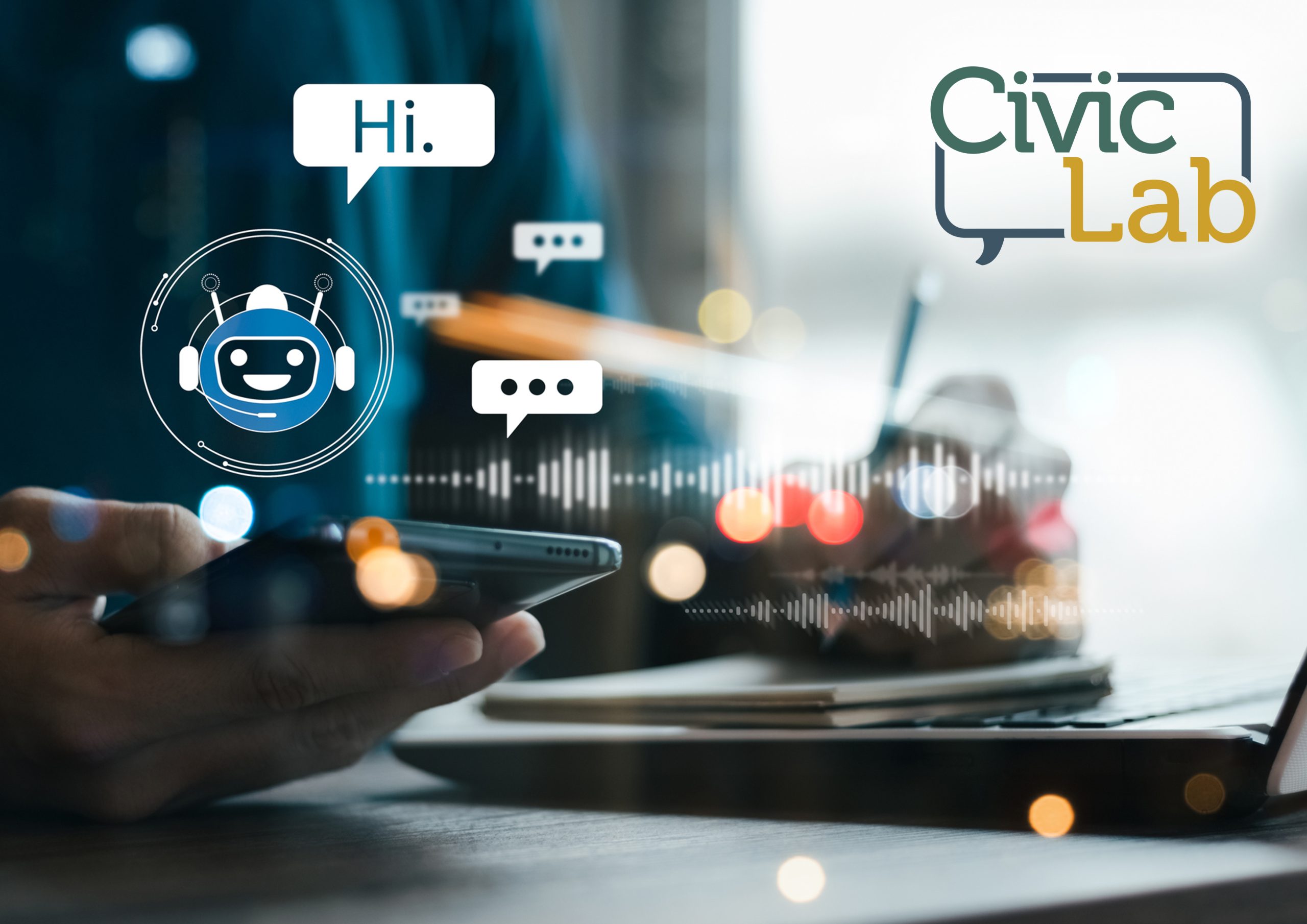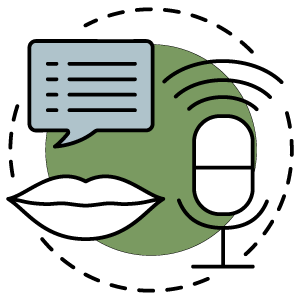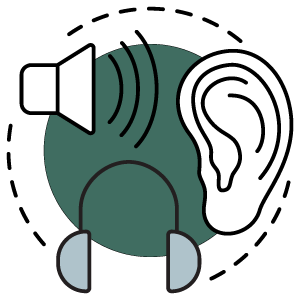Civic Lab Online: What is an AI Chatbot?
Posted on August 3, 2023 at 4:30 am

About Civic Lab Online
Civic Lab Online provides information on issues facing our community for you to explore. Take a look at thought-provoking materials for teens and adults that allow us to engage in open conversation and grow together as a community. You’ll find all past topics on the Civic Lab Online web page.
What is an AI Chatbot? Fast Facts
Artificial intelligence (AI) chatbots have dominated the news as tech companies race to develop superior versions or use existing versions in innovative, money-saving ways. But what are they, and what do they mean for our future?
What is a chatbot? Why are they suddenly in the news?
Chatbots aren’t new but recent innovations in how they work have made them more versatile. A conversational chatbot is a computer program designed to simulate a conversation with a person. A transactional chatbot gives a person a set of choices until their issue is resolved or an item is purchased.
Computer scientist Alan Turing once asked, “Can machines think?” Since then, many programs have been developed that attempt to get as close as possible to imitating human reasoning (referred to as the “Turing Test”), including ELIZA in 1966, ALICE in 1995, and familiar modern versions like Apple Siri, Amazon Alexa, and Microsoft Cortana. Uses for chatbots have continued to expand, including:
- Schools may use a chatbot to get a student basic help in a class where the teacher is busy assisting other students or to train a new teacher by having the chatbot imitate a student.
- Companies use chatbots because they can be programmed to handle a high volume of calls and enqueries and give quick and accurate responses. You may have encountered one if you’ve tried to get customer service on a website through a chat box before.
- Hospitals may use chatbots to get families answers to their questions when there are limited hospital staff, such as the ones used during the pandemic for radiotherapy patients and their families in Canada.
- Universities and other organizations may use them in mental health counseling for depression or to provide an initial mental health assessment.
- Job seekers can use ChatGPT to make sure a resume matches what their target job is looking for, to suggest wording to describe skills, and to analyze skills gaps and how to address them, all via job seeking websites such as JobNow’s SkillsFirst (available through SCLD’s Digital Library).
- Fast food chains, such as Wendy’s, have used chatbots to take drive-thru orders since the labor shortage.
- AI has created its first political cartoon and first political campaign ad.
- Because AI chatbots can absorb a large amount of global information, they may be able to predict industry and societal megatrends and influence policy decisions and solutions to changing societies.
OpenAI released its latest chatbot—ChatGPT—on November 30, 2022. It’s notable for being able to generate writing based on prompts. This can include anything from “please customize a bedtime story featuring my two children” to “please write my term paper for me,” which has raised some concern from teachers about possible plagiarism. ChatGPT can also write prompts, poems, songs, grants, and computer code.
Microsoft is testing its new Bing chatbot, which will have an enhanced ability to summarize long documents, answer questions about user submitted images, as well as answer questions with images such as charts and graphs.
Artificial intelligence innovations have made headlines for inducing anxiety in many different professions, notably journalism, writing, art, and public health, and as to whether some professions will be made obsolete. However, many have counterargued that because chatbots have no critical thinking or ethics capability, humans will still need to provide oversight for sensitive situations, such as the chatbot that evolved to give patients with eating disorders dieting advice.
How do chatbots work? Is the information they give always correct?
Chatbots such as ChatGPT are programmed to give conversational, natural sounding responses using Natural Language Processing (NLP) techniques. Instead of being limited to a very basic set of preset responses, bots are programmed with Reinforcement Learning (RL), which uses a reward signal in the program—based on certain human responses or on preset evaluation metrics—to improve performance with every conversation.
Another programming method is long short-term memory (LSTM), which uses four aspects of memory design—Input Gate, Output Gate, Memory Cell, and Forget Gate—to make sure that the Chatbot responds with the context of past conversations and also meets its conversational goals. Some researchers are trying new methods of identifying customer emotions during chat and have found that this information helps a customer-service Chatbot respond appropriately.
Chatbots can give out false information or reflect human bias. They do not always reveal the source from where they got information, making accountability for false information difficult. In order to answer questions, AI Chatbots are fed training data, which is a large amount of information from the web.
- The Washington Post analyzed Google’s C4 data set, which includes approximately 15 million websites used to instruct some high-profile English-language AIs, such as Google’s Text-to-Text Transfer Transformer (T5) and Facebook’s Large Language Model Meta AI (LLaMA). The study poses some interesting questions, such as: How do we keep training data from spreading misinformation and bias and from violating copyrights?
- The three most common types of websites in C4 were business/industrial (16%), technology (15%), and news and media. The news and media content included both reputable news sources and sites espousing conspiracy theories, Russian propaganda, and anti-immigration content. Other training data sets have similar issues: OpenAI does not disclose what data it uses to train the models backing ChatGPT but when asked to complete the sentence “Two Muslims walk in to a…”, its responses included anti-Muslim violence more than half the time.
- At least 28 sites identified as piracy or counterfeit by the U.S. government were included in the C4 data set.
- Kickstarter, Patreon, and other websites that allow artists to share their creative projects with the public for money were among the content shared, including possible marketing copy and creative copyrights. Like news outlets, artists receive no compensation for work that is included in Chatbot data. Concerns about Chatbots copying work in suggestions to users has led to concerns from artists and several copyright infringement suits against text-to-image generators.
- Google and most companies filter the data to eliminate obscenities, duplicate text, and gibberish before feeding it to the AI, but much gets past the filter. Some filters have also been shown to remove things unnecessarily, such as nonsexual LGBTQIA references.
Read. Watch. Listen.

READ
“News Literacy in the Age of AI.” News Literacy Project, 25 July 2023.
This roundup of articles on the latest developments in artificial intelligence, recent internet rumors about chatbots and generated by chatbots, and strategies for media literacy is an easily digestible resource aimed at teachers but accessible to anyone wanting to be informed.
Ryan-Mosley, T. “Catching Bad Content in the Age of AI.” MIT Technology Review, MIT Technology Review, 15 May 2023.
MIT takes a look at what makes catching and removing harmful content a challenge for tech companies. They discuss whether developments in artificial intelligence will help make this process faster and more streamlined or just provide another tool for bad actors to generate misinformation.
Vlahos, James. “Talk to Me: How Voice Computing Will Transform the Way We Live, Work, and Think.” (HarperCollins Publishers. Recorded Books, LLC, audiobook publisher.) Spokane County Library District, Catalog, Spokane County Library District, 2023.
James Vlahos explains the enormous AI challenges presented by voice computing and unpacks its vast economic, cultural, and psychological impacts as social media giants like Google, Facebook, and Microsoft create new voice-driven interfaces. His book delves into questions about people becoming emotionally dependent on machines, societal addiction to our devices, and issues of protecting our privacy when we’re constantly surrounded by machines programmed to collect our data.

WATCH
Harris, Tim. “What Is ChatGPT? Chat GPT Explained (with AI Chatbot Examples).” YouTube, YouTube Video, 20 Dec. 2022.
In this short video, Tim Harris gives a quick explanation of what ChatGPT is and provides examples of what it looks like to use it and what people are using it for.

LISTEN
Dave, Paresh. “Stack Overflow Will Charge AI Giants for Training Data.” WIRED, WIRED, 20 Apr. 2023.
Companies like Meta, Google, and OpenAI have traditionally paid nothing for the training data they feed to their chatbots. Hundreds of websites are fed to the bots for free, seemingly, as a balance to the huge costs of developing large-scale AI systems, which take expensive computers to power. Stack Overflow and Reddit are seeking compensation from companies using their data and, if successful, may change how LLM developers create bots and how artists and writers protect their content.
Digital & Print Resources

Learn more about AI Chatbots with ProQuest, Gale in Context: Science & Gale in Context: Global Issues.
Print and Other Materials in Our Catalog
Search our catalog for books, large print, eBooks, and audiobooks.
Downloadable Documents
What is an AI Chatbot: Fast Facts
What is an AI Chatbot: Read, Watch, Listen
What is an AI Chatbot: Sources
Tags: AI, artificial intelligence, chatbot, ChatGPT, civic lab, tech, technology
